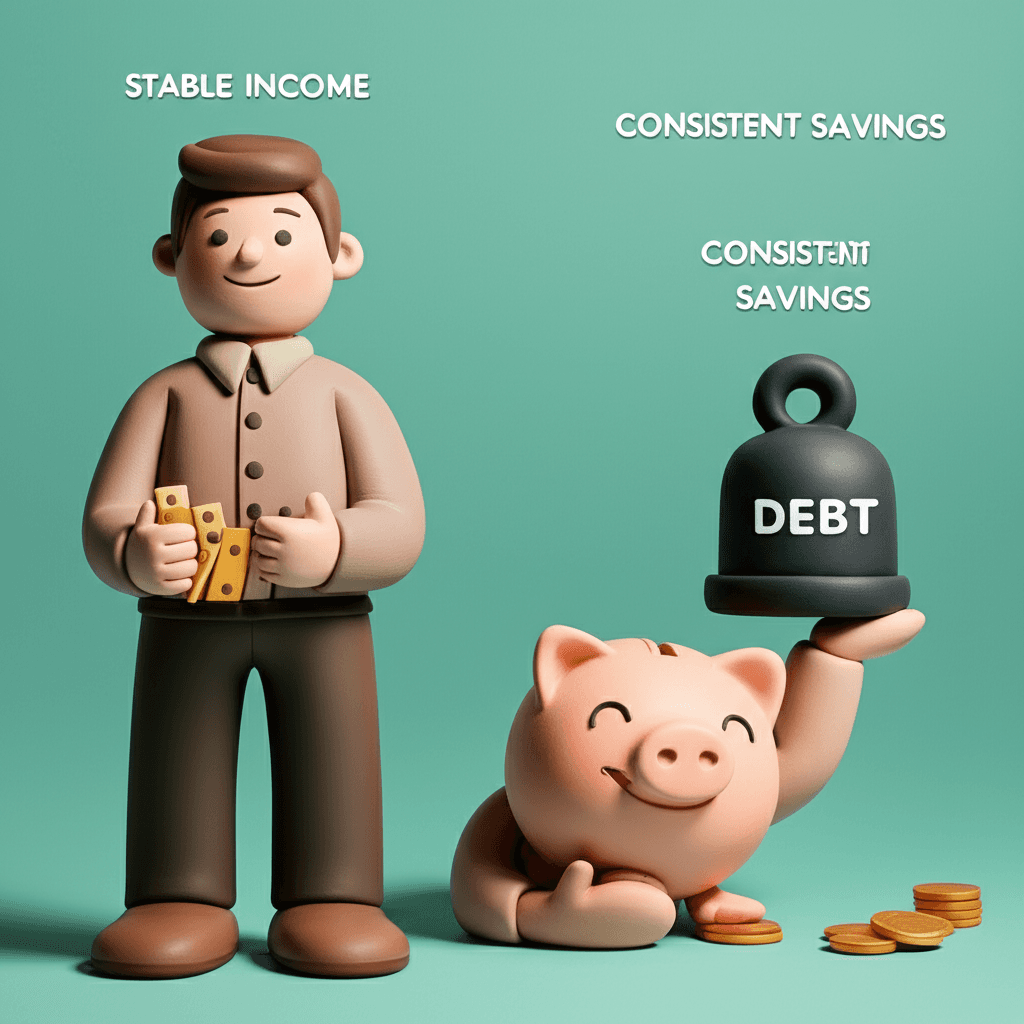Unlock Your Home Loan Potential: An Expert Guide to Boosting Your Borrowing Capacity in Australia
Learn how to improve your financial profile, manage debt, and demonstrate savings to secure a larger home loan from Australian lenders.

Navigating Australia's property market in mid-2025 is a significant challenge, and securing the right home loan is often the biggest hurdle. Understanding your borrowing power is the first critical step, yet many potential buyers are unsure what lenders truly value. Conflicting advice about credit cards, spending habits, and different income types can leave you feeling confused and discouraged. This guide cuts through the noise. We've distilled expert advice from financial advisors and bank specialists to provide a clear, actionable roadmap for maximising your borrowing capacity, ensuring you can confidently step onto the property ladder.
The Three Pillars of Loan Approval: What Lenders Look For
When assessing your home loan application, lenders are primarily concerned with one thing: your ability to repay the loan without putting yourself under unnecessary financial stress. They boil this down to three core pillars that paint a picture of your financial health and reliability.
1. Stable and Consistent Income
Your income is the foundation of your application. Lenders need to see a consistent and reliable flow of funds. This doesn't just mean providing a recent payslip; it's about demonstrating stability over time. If you're a freelancer or contractor, this might mean providing tax returns from the last two years. For those on parental leave, a letter from your employer confirming your return-to-work salary is crucial. The goal is to prove that you have a dependable source of income to service the loan long-term.
2. Minimal Existing Debt
Lenders look at your total debt commitments, not just your home loan. The less existing debt you have—such as credit card limits, personal loans, car loans, and Buy Now Pay Later services—the more capacity you have to take on a mortgage. A high credit card limit, even with a zero balance, is viewed as potential debt that could be drawn upon, thus reducing the amount a bank is willing to lend you.
3. A Proven Ability to Save
Your savings history is a powerful signal to lenders. It demonstrates financial discipline and shows that you can live within your means. A consistent pattern of saving, even if it's a modest amount each month, is viewed far more favourably than a large, recent deposit that can't be explained (like a gift or inheritance without context). This history proves that you can manage your money effectively and are likely to handle mortgage repayments responsibly.

Debt Deep Dive: How Your Liabilities Impact Borrowing Power
Understanding how different types of debt are assessed is key to cleaning up your financial profile before you apply. Lenders scrutinise every liability, as each one represents a claim on your future income.
Credit Cards: The High-Limit Trap
Many Australians play the frequent flyer points game, accumulating multiple credit cards with high limits. While the rewards can be tempting, this strategy can significantly damage your borrowing power. Lenders assess your potential to max out every card, not your current balance. For example, a $20,000 credit limit could reduce your borrowing capacity by $80,000 or more, depending on the lender's assessment criteria. Before applying for a loan, it is highly advisable to lower your credit limits or cancel any cards you don't actively use.
HECS-HELP Debt
Your Higher Education Loan Program (HECS-HELP) debt is factored into your overall financial assessment. It is treated as an ongoing liability that reduces your net income. While a university education can lead to higher future earnings, the repayment obligation is considered in the here and now. The good news is that from late 2025, policy changes may mean that those close to paying off their student loans might see less of an impact on their serviceability calculations.
Buy Now Pay Later (BNPL) Services
Services like Afterpay and Zip are increasingly popular, but lenders view them as a form of debt, similar to a credit card. They look at your total available limit and repayment history. Frequent use of BNPL can be a red flag, potentially signalling to a lender that you rely on short-term credit to manage your day-to-day expenses, which can negatively impact their assessment of your financial discipline.

Your Spending Habits Under the Microscope
Yes, lenders do look at your bank statements, and your spending habits tell a story. While they don't expect you to live like a monk, they are looking for responsible financial behaviour. Here’s what they notice:
Discretionary Spending: Multiple food delivery orders per week, frequent online shopping, and regular gambling transactions can raise concerns. One applicant's application was questioned because of a recurring daily $20 charge for parking at a casino—it was simply the cheapest parking near their work, but it required an explanation.
Saving for a Goal: If you are saving for a big expense like a European holiday, that's perfectly fine, provided you aren't going into debt to fund it. As long as your spending doesn't outpace your income and you continue to save, it demonstrates good financial planning.
The Psychology of Spending: Financial experts note that using credit cards for daily expenses can lead to spending 12-18% more than using a debit card. Being mindful of this can help curb unnecessary expenses and boost your savings rate, a detail that powerful real estate analytics can help you track in your own budget.
Navigating Special Circumstances
Life isn't always straightforward, and lenders have processes for various personal and professional situations.
Income Variations and Parental Leave
For freelancers, contractors, or those with irregular income, lenders typically require two years of tax returns to establish an average income. If you are on parental leave, you will need to provide a letter from your employer confirming your return date and salary, especially if you plan to return part-time. Proactive communication with your lender is key to navigating these scenarios smoothly.
Citizenship and Residency Status
Your residency status can influence your eligibility and loan conditions. Australian citizens and permanent residents generally have access to a wider range of loan products and government grants. Temporary residents and foreign nationals may face stricter criteria, such as requiring a larger deposit and being ineligible for first-home buyer schemes. It's essential to discuss your specific visa status with a lender early in the process.
Conclusion: The Balancing Act to Home Ownership
Maximising your borrowing power is a balancing act. It's about demonstrating to lenders that you are a reliable and responsible borrower through disciplined saving, diligent debt management, and stable income. By taking control of your finances and understanding what lenders are looking for, you can significantly improve your chances of securing the loan you need to buy your dream home. Remember, these preparations are not just about getting a loan; they're about setting yourself up for a sustainable financial future once you have the keys.
Ready to turn this knowledge into action and find a property that fits your new, maximised budget? Our AI Buyer's Agent provides personalised guidance through every step of your property journey, from financial preparation to finding the perfect home.
Frequently Asked Questions
Do frequent flyer credit cards really affect my borrowing power?
Yes, absolutely. Lenders assess the total credit limit available to you, not just your current balance. A high credit limit, even if unused, is seen as a potential debt that reduces the amount you can borrow for a home loan. It's wise to lower limits or close unused card accounts at least three to six months before applying.
How far back do banks look at my spending habits?
Lenders typically ask for three to six months of bank statements. They review this period to understand your spending patterns, identify any undisclosed debts, and verify your saving capacity. They are looking for consistency and responsible financial management.
Can I get a home loan if I'm a freelancer or on a contract?
Yes, but you will need to provide more documentation to prove income stability. Lenders usually want to see your last two years of tax returns and Notices of Assessment to calculate an average income. Having a consistent work history in your field and a healthy pipeline of future work will also strengthen your application.
